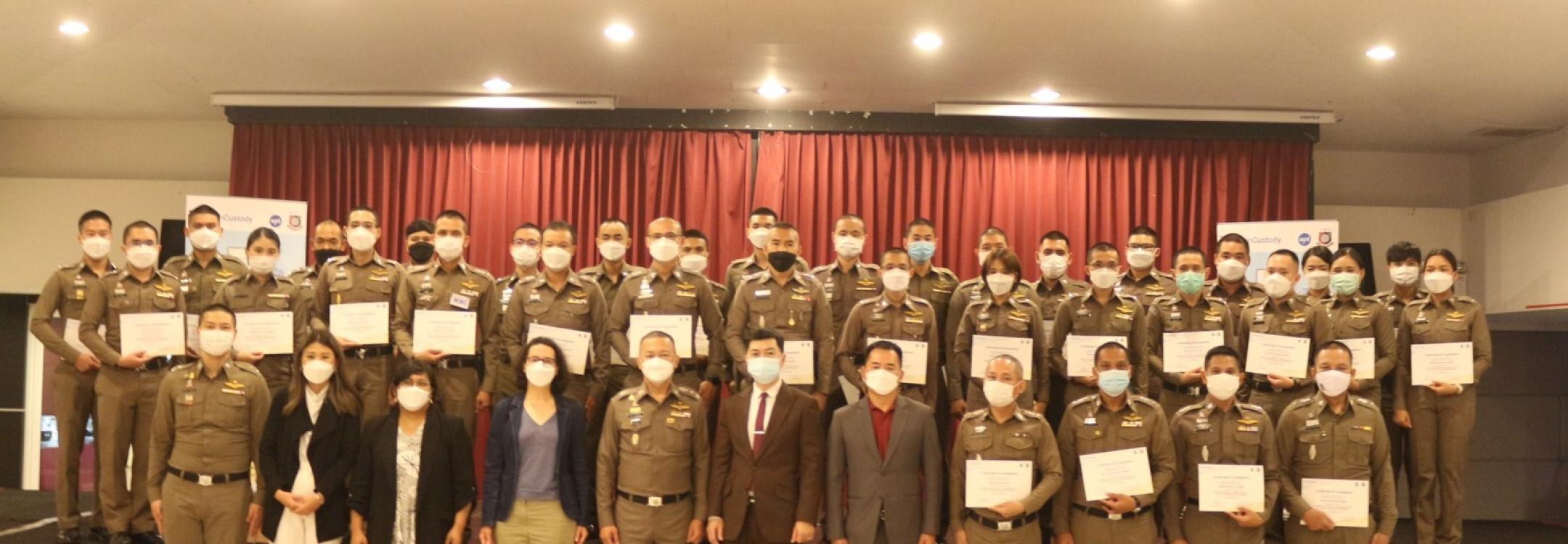
As part of our #SafeInCustody project, the APT has continued its dialogue with law enforcement officials in Thailand on moving towards the implementation of effective interviewing in police training and practices.
A two-day seminar, held on 4-5 May 2022 at the Royal Police Cadet Academy, brought together 38 officials from different policing agencies to discuss the Principles on Effective Interviewing for Investigation and Information Gathering, known as the Méndez Principles, and the possible development of a training module.
APT Secretary General Barbara Bernath underlined that “the Méndez Principles propose a new and comprehensive guidance for authorities to move away from coercive interrogation, a change that will enable better outcomes for investigations while respecting human rights and the dignity of all”.
I would like to know how to conduct an investigation with a human rights approach. It is a great opportunity for Thai police to explore the new concept of investigation and engage with an international organisation and experts.
The seminar drew on the experience and expertise of Thai practitioners trained in conducting effective interviewing.
Santanee Ditsayabut, Director of the Nitivajra Institute and a member of the Méndez Principles Advisory Council, presented an overview of the Principles and explained how the legal safeguards they include are in line with the Thai Criminal Procedure. She also underscored the right to the presumption of innocence.
“In principle, we do not need a confession or a confirmation of our assumption. We need the truth,” Ms Ditsayabut said. “We have to create a safe space for the interviewee to feel comfortable to revive their memory and provide us accurate information. It is the duty of the police to gather information and analyse the data, not just to get the confession.”
Pol. Capt. Khemachart Prakyhongmanee of the Department of Special Investigation, led a practical session on current investigation practices and the implementation of effective interviewing. He stressed the importance of good preparation and building rapport with interviewees, having used effective interviewing techniques in many high-profile cases.
Pol.Lt.Col Peabprom Mekhiyanont, Deputy Superintendent of Cyber Crime against Children, added that “implementation of safeguards, such as the notification of rights, will ease concerns of the suspects and the victims and reassure them that they are protected under criminal justice processes.”
The psychological importance of empathy and building rapport was also addressed by Nattasuda Taephant, Dean of the Faculty of Psychology, Chulalongkorn University. “When a person is under pressure from coercive interrogation, they may create false memories to support those beliefs and illusory memories of crimes they did not in fact commit,” Ms Taephant said. “They may also be unable to remember important personal information.”
The seminar included a panel discussion on the possible development of training on effective interviewing, taking into consideration existing training courses on investigation and on interviewing at the Royal Police Cadet Academy and other training agencies. In working groups, participants shared their views and emphasised the importance of providing cadets and officers with practical training.
‘We would like our students to be ready and professional when they go into the field.” Pol.Col. Siriphon Kusonsinwut of the Institution of Investigation and Interrogation. “This seminar not only raised awareness about the new Méndez Principles and techniques for effective interviewing, it was also an important step in building ownership to move towards integrating this approach into the training and practice of police in Thailand.”
The #SafeInCustody project is funded by the European Union. This content is the sole responsibility of the APT and does not necessarily reflect the views of the European Union.

